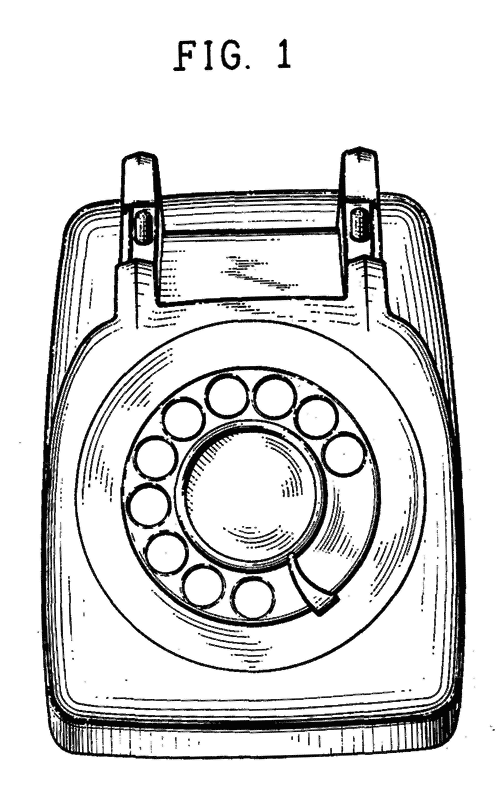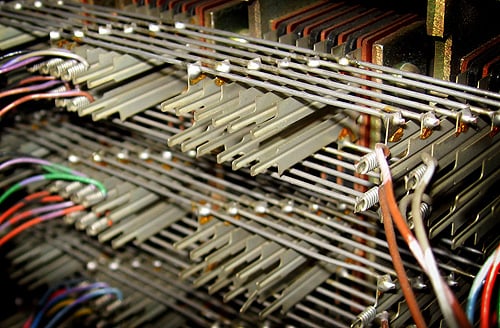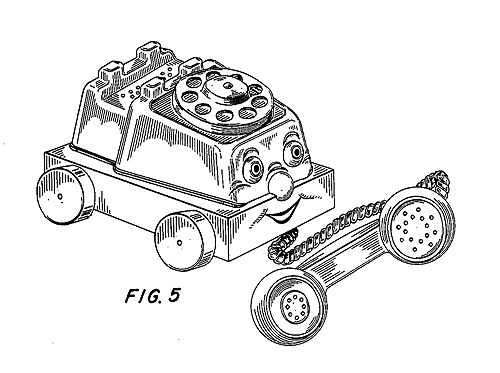Rotary Dial

Image: Telephone Desk Stand, U.S. patent #180,081 (palindromic!). Image research: Anil Dash.
Necessary Introduction
So-called “people” on the Internet are writing about how no one blogs any more. I am one of these no-ones, by which they mean those of us who used to write things on the Internet and post them to our own servers, but have now instead gone over to centralized services like Twitter and Tumblr and Facebook, where we spend our time—the diaspora of the alienated transformed by convenience into an aggregation of the aggrieved, or something like that. And they think it’s a shame, and it is a shame. So I took the Blogging Challenge and tweeted:
If folks want to go LEAGUE OF INDIE BLOGGERS I’m down. I am here and my wife says it’s okay if I really have to. To the webrings!
— Paul Ford (@ftrain) August 20, 2012
First piece tomorrow about meetings or maybe dial telephones, 500+ words.
— Paul Ford (@ftrain) August 20, 2012
That’s some context for you, because this is not some descent-from-Olympus nonsense like I usually pull. This is straight-up blogging, amateur prose written quickly and with neither guiding stricture nor sober editing. I am going to tell it like it is, right from the heart, and I am going to tell it about telephone dials, because a man has to live by a code, and my code is unary loop disconnect dialing.
Dials
Let’s get to it. There aren’t as many dials in this world as there used to be, but once there were tens of millions. The rotary dial (or “calling dial” if you look at the patents in the 1920s) represented a big change in how a person approached the Bell System network. Prior to dials you picked up the phone and the suddenly broken circuit animated some light in an unseen switching station; soon would come an operator, a real woman (they tried men but they talked back and wanted too much advancement) and the operator would say: “Number please?” Or something along those lines. Get me Baltimore! you might say. Or: “Murray Hill 5-9975.”
“Right away, Ma’am.” Or Sir. Then the operator, who had to signal to ask permission to wipe her brow, would move some plugs around to make the connection. Now you were emperor over leagues of copper string.
Decades pass and here, finally, comes the calling dial: pick up, a live circuit is offered up; start dialing. Ringring.
When you dialed somewhere on the other end of that wire was a relay—a large heavy ozone-smelling device that heard the clicks. Or rather it didn’t hear as much as register modulating electric pulses. These are beautiful, abstract, incredibly dumb devices that clack. Anything that they could do a matchbox-sized computer can do today.

“Detail of back side of a Western Electric 6-wire 100-point crossbar switch (model 324-N) showing ‘banjo’ wiring.”—Wikipedia; photo by user Yeatesh copyright CC BY-SA 3.0.
Western Electric was the manufacturing arm of the telephone monopoly. They made everything: Phones, switches, equipment for the linemen. Sometimes you have to marvel at the audacious monopolistic excitement of it all. The Bell System employed a million people in thousands of different positions and traded on the stock exchange under the letter “T,” the ultimate in financial domain-name shortening. Sure, Wal-Mart employs 2.2 million people (two hundred thousand to stock the shelves and two million to keep them from unionizing). But Glen Campbell won’t show up and sing “The Michigan Greeter” about Wal-Mart, will he?
The rotary dial was a building block of civilization, the key that unlocked the phone system for millions of people. It was an integral part of your parents’ lives. Imagine your father stuffing his dirty fingers into the waiting greasy dialpits, over and over and over again, over and over and over and over again, ringing your mother’s bell until finally she shudders and reaches—for the phone and says: “Hello? This is [YOUR MOTHER’S NAME].” “Hey,” says your father, “this is [YOUR FATHER’S NAME].” “Well, how do you like that?” asks your mother even though she likes it very much. He asks her out to dinner. “Let me check my busy calendar,” she says. She goes so far as to coyly ruffle pages of the nearby phone book. “As it turns out,” she says, “I’ve had a cancellation.” Not much later your father drives by and picks her up and off they go. And usually they would have just had dinner, but this night—this night initiated by dialing on a rotary phone—they have a couple of nice chops and too much red wine, and, maybe it was the pretty moon, they find themselves engaging in penetrative sexual intercourse, your mother and father. Both of them. You can hear the smushing-together of bodies, soft and moist like warm gingerbread, their skin traversed with thick bristles of interlocking hair, hair like the hair of wild boar. Never forget the both of them, eyes half-lidded, hairy-gingerbread bodies glistening on a bed with maroon sheets. The smell of stacks of damp pennies. Your mother and father. Pennies.
And now here you are! And you’re amazing. All thanks to that beautiful rotary dial. Let’s open one up and take a look inside:
Mechanism-wise you can intuit quite a bit about the whole system by watching that video. Note for example the way the rotary action causes a coil-uncoil with the middle whirrer, which uninvolves the pen gear, in turn causing the quirt to devilate, which itself leads to the essential pulsing grombus before the return hose coil inductor is repronged. Couldn’t be simpler, and yet something so elegant brought millions of people (like your parents) together—just as, years later, the iPhone would bring people together to hate Android. After all, it wasn’t the phone itself but the network that mattered. That’s a trite statement in this age of Big Social, but the phone people invented the idea of the network as we understand it, the idea of connecting people together whenever they wanted. “Social” is just a riff on the metaphors and understanding around “phone.”
The phones connected folks, but the phone book described a town. In even a mid-sized town the phone book was heavy, printed on cheap paper. The paper was so cheap that ink would bleed and spread during printing, so much so that they used special fonts–Bell Centennial starting around the 1970s, and before that Bell Gothic)—that had various little divots, called ink traps, within the letters so that less ink was transmitted during printing, and thus the ink-bleed could be put to service—and the effect was sort of peculiar to the phonebook, the way the numbers and letters were slightly blurry, with the grain of the paper essential to the form of the type.
The phone book at its essence was a practical tool for translating names into numbers; it was a symptom of the Bell System, not a cause. But I have odd, fond memories of poring over it to learn a great variety of things irrelevant of whether I’d ever make a call or not; there was of course just looking through the names to see who was who; there was discovering the addresses of friends or enemies—and there was a map of the town itself, in the front section, and, oddly, there was often a perpetual calendar. You could engage in an enormous variety of fantasies and plots just by flipping through the flimsy paper, or learn about your crushes, and about the people your crushes were dating while you stayed home and read the phone book.
Those were the white pages, the fattest part, everyone named and listed. Then came a slender striation, the blue pages, the list of government and community services. You could find out in the blue pages what all of the offices were at a college or a hospital, all the different divisions of the mayor’s office or the high school. Like a lot of people I like to know how things sort themselves out, and who is in charge of what. This information was urgent to me, and otherwise unavailable without asking an adult, which I hated to do. They were always so suspicious. Why do I want to know how the hospital works? Because I am momentarily interested in hospitals. I hate this town and I hate you. Leave me alone.
If ever there were something to make an information architect’s heart sing it was the index of goods and services of the yellow pages, the great swath of color—smaller than the white pages in breadth but way more varied. A list of places that could clean out gutters? A collation of all the pizzerias within a five mile radius, with sketches of fat Italian chefs? Check, twice. And coupons, so many coupons. You could plan a life there, or a good couple of weeks. Once a year they’d do that, the people, just send you a big list of all the people and addresses and businesses and offices in your town, and trust you to do the right thing by it.
Progress was a phone book released every year, a cycle of civic rebirth. It grew thicker as more people moved to town, and people commented on that. “I can remember when it was half that size,” a parent would remark, nostalgic for their own lost and smaller world. Is there anything like that today, any single document with creators so naïve as to believe that they could deliver all that humans had to offer in black Bell Centennial on white, blue, and yellow paper, indexed, tagged, and sorted? And will there ever again be humans so naïve as to believe, as I did, that when they held a single book they held the whole white, blue, and yellow world?

Image: Trundle Toy, U.S. patent #196,737, 1963.
Edits
A tweet from Rick Prelinger pointed out that the typeface Bell Gothic preceded Bell Centennial. I edited the piece to clarify.
@ftrain that was Bell Gothic, designed 1938. Bell Centennial was a 1978 redesign.
— Rick Prelinger (@footage) August 21, 2012
A a tweet from Alan Gutierrez explained that exchange codes were not pronounced in any special way. I removed a sentence accordingly.
.@ftrain MU was not capitalized prior to dials and never pronounced. Two letter acronyms for exchanges were added for the sake of dialing.
— Alan Gutierrez (@bigeasy) August 21, 2012
A tweet from Alan Gutierrez explained that exchange codes were not pronounced in any special way. I removed a sentence accordingly.
In the Facebook Group, Dan Brickley pointed out that where I’d written “decentralized” I meant “centralized.”
A tweet from Dan Phiffer pointed out that I had doubled an “A” in the above correction.
@ftrain I spotted a typo in your Rotary Dial post’s updates section—“A a tweet…” appears twice. Shipping enough fixes introduces new bugs.
— Dan Phiffer (@dphiffer) August 22, 2012
I appreciate people who help.